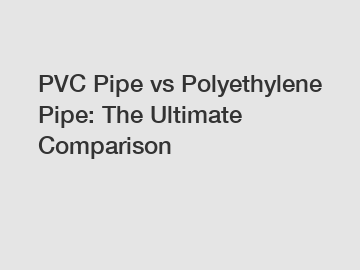PVC Pipe vs Polyethylene Pipe: The Ultimate Comparison
PVC Pipe vs Polyethylene Pipe: The Ultimate Comparison.
When it comes to plumbing and irrigation systems, selecting the right type of pipe is crucial to ensure reliable and efficient performance. Two commonly used materials in this field are PVC (Polyvinyl Chloride) and HDPE (High-Density Polyethylene), also known as polyethylene. While both these pipes offer excellent durability and versatility, there are several key differences between the two. In this article, we will delve into the ultimate comparison of PVC pipe versus polyethylene pipe to help you make an informed decision for your piping needs.
1. Strength and Durability.

PVC Pipe: PVC pipes are known for their exceptional strength and durability. They are rigid and can withstand high pressure, making them ideal for applications that require rigorous handling. PVC pipes are resistant to abrasion, chemicals, and corrosion, which contributes to their long lifespan. However, exposure to extreme temperatures can cause PVC pipes to become brittle over time.
Polyethylene Pipe: Polyethylene pipes have excellent toughness and flexibility, allowing them to withstand impact and pressure. They are highly resistant to cracks, breaks, and other forms of damage, making them an excellent choice for underground installations. Polyethylene pipes also have a high resistance to corrosion and chemicals, ensuring their longevity. Unlike PVC pipes, polyethylene pipes can withstand freezing temperatures without becoming brittle.
2. Cost-effectiveness.
PVC Pipe: PVC pipes are generally more affordable than polyethylene pipes. The lower material cost combined with easy installation and maintenance make them a cost-effective option for a wide range of applications. PVC pipes also have a longer lifespan, reducing the need for frequent replacements.
Polyethylene Pipe: While polyethylene pipes may have a higher initial purchase cost, they prove to be cost-effective in the long run due to their superior durability. The need for repairs and replacements is significantly reduced, resulting in lower overall maintenance costs. Polyethylene pipes are also lightweight, making them easier to transport and install, which can further contribute to cost savings.
3. Flexibility and Ease of Installation.
PVC Pipe: Although PVC pipes are rigid, they can be easily cut, joined, and installed using solvent cement. However, due to their rigidity, PVC pipes require more fittings and connections, which can increase the chances of leaks. The lack of flexibility can also make it challenging to maneuver around obstacles or uneven terrains during installation.
Polyethylene Pipe: Polyethylene pipes are highly flexible, which allows for easier installation, particularly in challenging terrains or around existing obstacles. The flexibility also means fewer fittings and joints, reducing the chances of leaks. Polyethylene pipes can be joined using heat fusion, creating a seamless and leak-proof connection. The ease of installation saves time and labor costs.
In conclusion, both PVC and polyethylene pipes have their specific advantages and suit different applications. PVC pipes are incredibly strong and durable, making them ideal for high-pressure applications. On the other hand, polyethylene pipes are highly flexible, cost-effective, and resistant to damage, making them suitable for underground installations. Ultimately, the choice between the two materials will depend on your specific requirements and project needs.
For expert advice and assistance in selecting the right pipe for your plumbing or irrigation system, feel free to contact us. Our team of professionals is equipped with extensive knowledge and experience to guide you towards the most suitable solution for your needs.
If you want to learn more, please visit our website HDPE sewer pipe, HDPE pipe specifications iso 4427, hdpe pipe sales.

Comments
0